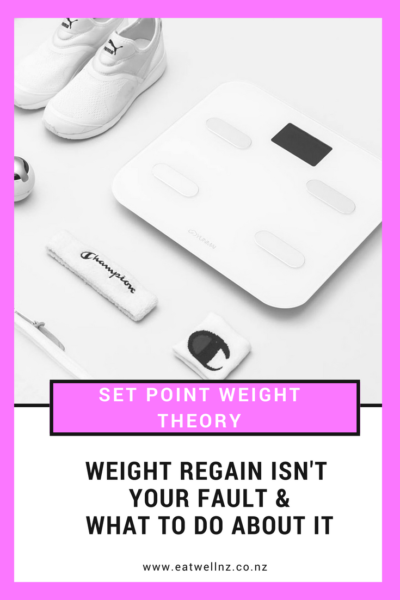
The Set Point Weight Theory helps explain why it’s so had to maintain weight loss. I hear many people blaming themselves – they just have no willpower, they ‘love carbs’ too much, they are too lazy to go the gym… BUT the truth is it’s not your fault. And while diet culture likes to sell the idea that we are in total control of our body weight, the real picture is not that simple at all.
The Set Point Weight Theory
We are lead to believe that our body size is totally in our own hands, but that’s not true at all. Research suggests that each individual has a weight range that it is genetically predisposed to maintain. This natural weight range is called your “set point range” and will be different for everyone. Our set point weight range is determined by our genetics, epigenetic effects (mechanisms related in switching on and off genes) and the environment we live in.
Much like a thermostat can keep a room temperature constant by responding to ups and downs in temperature, our body works to maintain our body weight within a certain range.
If we dip below that weight range our bodies literally change our hormones and messengers in order to increase appetite and reduce metabolic rate in an effort to increase our weight to it’s post weight loss level. This is very real effect and is a key driver of weight regain after weight loss. It’s not your fault – it’s the set point weight theory in practice!
Within 5 years, most people are back at their starting weight and it’s because of these physiological changes which happen after weight loss. So while we are often told it’s our fault for over eating or choosing the ‘wrong’ foods, it actually has very little to do with your willpower, and much more to do with your biology. A good summary of how this happens can be found here.
Similarly if you are above your set point weight (which can happen due to illness, stress, trauma etc), once you normalise your eating behaviours and physical activity levels over time, your weight can return to it’s set point.
How do I know what my set point weight is?
There’s no magic way to tell what your set point weight is.
Set point isn’t one number, but probably a range of around 5-10kg.
The easiest way to look at it is the weight you can easily maintain when eating intuitively and maintaining a normal level of physical activity.
If you recognise are unable to tune in to your hunger and fullness signs, regularly eat past the point of comfort, if you go through periods of eating out of control, regularly use food as a coping mechanism for emotions such as sadness or boredom, you may be above your set point weight.
If you have to exercise excessively, feel hungry a lot of the time and are regularly restricting your diet to maintain your weight, then that’s not likely to be the weight at which your body will naturally sit.
Sometimes it can be hard to let go of a certain number or body shape, but letting our bodies settle at their natural point without constantly battling food and exercise brings about a sense of balance and frees up so much mental energy for more important goals.
How will I know when I am at my set point weight?
There is no definitive answer for this, but if you’ve been eating intuitively and engaging in moderate, sustainable physical activity for over a year or so, and you feel you have stayed around the same size, then it’s possible this is your set point weight.

Can you change your set point weight?
In a world that tells us being in a larger body is not acceptable, many people want to know if they can ‘downgrade’ their set point weight. It doesn’t look that way. Only a small proportion of people are able to lose large amounts of body weight and maintain it for more than 5 years.
Some people believe that a persons set point can be increased and after a period of maintaining a higher body weight, this becomes the new ‘normal’. Back in the day, it made evolutionary sense to store body fat in case of future famine or food shortages. Today we’re unlikely to see such situations, but our bodies don’t know this.
While many people can lose weight, in the long term most people gain it back, and some people end up heavier than when they first started trying to lose weight. Our bodies see gaining a little extra weight like an insurance policy, just in case we go into ‘famine’ – aka diet mode, again. There’s lots we do not yet know about how our body weight is controlled and just what is involved.
While we don’t know everything involved in weight regulation we do know our bodies are remarkably smart.
We can trust them. Studies suggest that those who do not diet/ don’t have restrictive eating practices are more likely to maintain a stable body weight than those who try to lose weight. That’s right – NOT trying to restrict/diet is related to a stable body weight! So instead of trying to fight your body, learning to listen to it can help you find a stable weight and also be more at peace with food.
If you’ve been on and off different diets and ‘healthy eating’ plans and are sick of struggling with your weight, then learning to become an intuitive eater can help you find a peaceful place with food and your body. If you’d like to work with me, get in touch here.
References:
Bacon, Linda, Health at Every Size: The Surprising Truth About Your Weight (www.HAESbook.com) – excerpt from here, accessed 3 June 2018
Harris, RB (1990) Role of set-point theory in regulation of body weight FASEB journal Dec 4 (15):3310-8
Why Do Dieters Regain Weight? by Traci Mann accessed 20/6/18


Leave a Reply